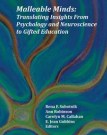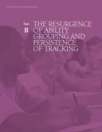
|
|
|
|
Featured
Topic | Resources |
Headlines |
Davidson Institute Updates |
Gifted News
|
|
Featured
Topic - Perfectionism
|
| |
Welcome back from summer vacation! Classes are now underway and you are
learning more about the characteristics of students in your classroom. Since educators work with a variety of personalities, we want to bring to your attention a personality trait which can affect a student positively or negatively depending on how it is expressed
- perfectionism. Someone who exhibits perfectionism compulsively strives for flawlessness and sets excessively high performance standards. Although it is
wonderful to have students who strive for excellence, the effects of perfectionism can be disabling.
The Q&A session with Thomas Greenspon discusses perfectionism and how educators can
work with student to turn this characteristic from disabling to enabling.
 Guest
Q&A Guest
Q&A
Thomas S. Greenspon, Ph.D. is a psychologist, author, marriage
and family therapist in private practice with his wife Barbara. Tom is
nationally known for his work with gifted and talented children, adults, couples and families. He has authored professional and popular articles and two books on the origins of, and recovery from, perfectionism.
What is perfectionism?
Perfectionism is a desire to be perfect (not “almost perfect”), a fear of imperfection, and
an emotional conviction that mistakes are signs of personal defects, and that being
perfect is the way to be acceptable to others. The intense anxiety about mistakes is
what separates perfectionistic people from those who simply pursue excellence. We
are
all disappointed when we make a mistake or do not make our goal; perfectionistic people
may, in contrast, be devastated by this.
Are there signs educators can look for to determine if their
students have perfectionist tendencies?
It’s easy to miss some perfectionistic gifted kids in school, since what you see is
assignments being done well and handed in on time. A closer look might reveal anxious
concerns about work being done in class, or about grades earned on work already
handed in. Although many perfectionistic kids get their work done ahead of time, some
are examples of a different “flavor” of perfectionism: procrastination. Not all
procrastinators are perfectionistic, but sometimes kids seem less concerned about the
nagging of parents and teachers than they are about handing work in and risking getting
less than a perfect grade. As a result, they put off completion. If you see a student
struggling with getting work started, or frequently re-starting because it isn’t “just right;”
or if so much time is spent getting the answers to the first questions on a test just right
that time runs out for completing the test, perfectionism may be part of the picture.
 What problems can arise with perfectionism? What problems can arise with perfectionism?
Most of the time, perfectionistic people simply experience a kind of chronic anxiety that
goes with always having to do things the right or best way. For some, there can be more
serious consequences. When depression is also part of the picture, the hopelessness of
ever being able to be good enough can make the depression worse, sometimes to the
point of becoming suicidal. Perfectionism can make eating disorders, depression,
anxiety disorders, or obsessive compulsive disorders much harder to treat (and vice
versa). Because some perfectionistic people can be hard on others around them,
intimate or friendship relationships can also suffer. Another serious, and seemingly
paradoxical problem with perfectionism is that the anxiety that goes with it actually
interferes with success. That’s the basis for the old adage: “The perfect is the enemy of
the good!”
Which classroom strategies would be most effective?
Perfectionism is a self esteem issue. Mistakes are seen as evidence of personal flaws,
and there is a fear of not being personally acceptable. While it is important to encourage
students, especially gifted ones who will most likely do fine, to relax and not worry so
much about outcomes, it is typically hard for teachers to be helpful in this way because
it doesn’t address the underlying anxiety. The stage needs to be set by initiating a
conversation with the student. Mentioning your concerns about what you see, and
wondering out loud about why getting things just right, or completely avoiding mistakes,
is so important, is a good first step. Ask yourself whether your own expectations that a
gifted student always do outstanding work might be in play. See if you can start an
ongoing conversation about these concerns; this can typically be more powerful if
parents are brought in as well. Do they see the same things at home? Have they talked
about it? Is perfectionism a family trait?
Conclusion
There is a particular empathic understanding which is crucial to helping perfectionistic
kids. While perfectionistic people can seem overwrought, overbearing, or puzzling in the
intensity of their concerns, it’s important to keep in mind that fear sometimes motivates
us to do crazy things. Perfectionistic people are not being dense or missing a point
about the futility of their concerns; they are hoping to find a way to demonstrate that
they are OK, and acceptable to others. Addressing those concerns is the essence of
helping someone move past perfectionism.
 A fuller discussion of these ideas can be found in my books, “Moving Past Perfect: How
Perfectionism May Be Holding Back Your Kids (And You!), And What You Can Do About
It,” and “What To Do When Good Enough Isn’t Good Enough: The Real Deal On
Perfectionism.” For counselors and those working professionally with gifted kids, see
“Perfectionism: A Counselor’s Role in a Recovery Process,” in the “Handbook for
Counselors Serving Students With Gifts and Talents,” edited by Tracy and Jennifer
Cross. A fuller discussion of these ideas can be found in my books, “Moving Past Perfect: How
Perfectionism May Be Holding Back Your Kids (And You!), And What You Can Do About
It,” and “What To Do When Good Enough Isn’t Good Enough: The Real Deal On
Perfectionism.” For counselors and those working professionally with gifted kids, see
“Perfectionism: A Counselor’s Role in a Recovery Process,” in the “Handbook for
Counselors Serving Students With Gifts and Talents,” edited by Tracy and Jennifer
Cross.
For the entire text of Dr. Greenspon's interview, please
click here to read this Davidson Gifted Database article.
|
|
|
|
Resources
|
| |
Davidson Gifted Database resources
Additional resources related to Perfectionism
|
|
|
|
In
the News
|
|
|
|
Davidson
Institute Updates
|
| |
 The Davidson Academy of Nevada The Davidson Academy of Nevada
A free public school, The Davidson Academy of Nevada
encourages and supports the abilities, strengths, and interests of profoundly gifted middle and high school students who score in the 99.9th percentile on IQ or college entrance
tests, such as the SAT or ACT. If you are interested in applying to The Davidson Academy for the 2014-2015 school year,
visit the
How to Apply page to access the new online
application system. Please visit the
Qualification Criteria page and the
Application Review Process
page for more information.
Prospective
students interested in receiving email updates about the
Academy can subscribe to
The Davidson Academy eNewsletter by
clicking here.
 Davidson Young
Scholars Davidson Young
Scholars
The
Davidson Young Scholars program provides FREE services designed to nurture and support profoundly gifted young people and their families, including talent development and educational advocacy, an online community, annual get-togethers, and the Ambassador Program. Applications are due the first of each month. For more information, see the
How to Apply and
Qualification Criteria
pages.
 Educators Guild Educators Guild
All educators, and people interested in gifted education, are invited to join
the
Educators Guild Discussion Group on Facebook and contribute to the ongoing conversation about how to best serve the academic needs of our nation’s brightest
students.
|
|
|
|
Gifted
News
|
| |
 A Modern Vision of Gifted Education Programs A Modern Vision of Gifted Education Programs
Recently published by Prufrock Press,
Beyond Gifted Education: Designing and Implementing Advanced Academic Programs provides a comprehensive, modern vision of programs and services for gifted and talented students. Written by four leading experts in gifted education, the book provides a complete look at the design and implementation of K–12 gifted programs. Readers are given real-world scenarios on topics such as cluster grouping, acceleration and increasing diversity.
 Book Uncovers Findings About how Talent Develops in Individuals Book Uncovers Findings About how Talent Develops in Individuals
This book from The American Psychological Association, the National Association for Gifted Children and The National Research Center on the Gifted and Talented provides insight on what research in psychology and neuroscience can tell us about talent development. In
Malleable Minds: Translating Insights From Psychology and Neuroscience to Gifted Education, psychologists and neuroscientists connect their findings and perspectives with experts in gifted and talented education to offer an innovative discussion about how their research might best support the needs of gifted students, and offer direction on the services they must receive to do so.
Ability Grouping on the Rise
 Based on more than 20 years of research, a
Brookings Institution report (PDF) suggests that elementary school teachers are now comfortable placing students into "ability groups" despite decades of controversy. The research finds that between 1998 and 2009, the percentage of fourth grade teachers who said they created ability-based reading groups increased from 28 percent to 71 percent. In math, between 1996 and 2011, the practice rose from 40 percent to 61 percent. The practice remained fairly constant in eighth-grade math, rising from 71 percent to 76 percent. Sources:
Brookings Institute,
USA Today,
Washington Post Based on more than 20 years of research, a
Brookings Institution report (PDF) suggests that elementary school teachers are now comfortable placing students into "ability groups" despite decades of controversy. The research finds that between 1998 and 2009, the percentage of fourth grade teachers who said they created ability-based reading groups increased from 28 percent to 71 percent. In math, between 1996 and 2011, the practice rose from 40 percent to 61 percent. The practice remained fairly constant in eighth-grade math, rising from 71 percent to 76 percent. Sources:
Brookings Institute,
USA Today,
Washington Post |
|
|
|
Closing Thought
|
| |
"When intensity and sensitivity are combined with idealism, as so often happens with bright children and adults, good things can happen because they can keenly see how things might be. But this can also lead to frustration, disillusionment, and unhappiness. Sometimes this prompts perfectionism
. . .
we must provide understanding and nurturance so that they do not feel alone and helpless in a world that seems so paradoxical, arbitrary, and even absurd."
~ James Webb, in 100 words of Wisdom: James T. Webb, Ph.D
|
|
|
|
If you have information to include in future
Educators Guild Newsletters, please email our EdGuild@DavidsonGifted.org.
If you have been forwarded this newsletter, and wish to receive future editions,
sign-up here. |
|
Davidson Institute for Talent Development
Supporting our nation's brightest young minds.
9665 Gateway Drive, Suite B, Reno, Nevada 89521
Phone: 775-852-3483 Fax: 775-852-2184
Email: EdGuild@davidsongifted.org Web: www.DavidsonGifted.org
www.DavidsonGifted.org/EdGuild.
NOTE: The appearance of selected programs and/or resources in the Davidson Institute's Educators Guild Newsletter does not imply an endorsement or affiliation. Programs and resources are highlighted for informational purposes only.
Visit the Davidson Institute's
Educators Guild Newsletter archive page.



"Like"
the Davidson Institute on
Facebook
and follow us on
Twitter.
The Davidson Institute also has a number of
YouTube videos!
|

 Guest
Q&A
Guest
Q&A  What problems can arise with perfectionism?
What problems can arise with perfectionism? A fuller discussion of these ideas can be found in my books, “
A fuller discussion of these ideas can be found in my books, “ The Davidson Academy of Nevada
The Davidson Academy of Nevada
 Davidson Young
Scholars
Davidson Young
Scholars
 Educators Guild
Educators Guild A Modern Vision of Gifted Education Programs
A Modern Vision of Gifted Education Programs Book Uncovers Findings About how Talent Develops in Individuals
Book Uncovers Findings About how Talent Develops in Individuals Based on more than 20 years of research, a
Based on more than 20 years of research, a